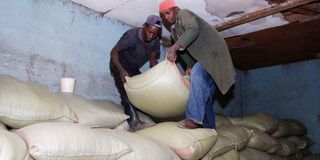Ensure good food storage

Workers arrange bags of dry maize in a store in Elburgon town, Nakuru County.
While there have been serious concerns over the rising cost of living, more so the price of food, farmers in most parts of the country have had a welcome reprieve following the sustained rains and the resultant good harvest.
But unlike when the government used to encourage the use of extension services, where the population was educated about crop and animal husbandry, most farmers are left at wit's end and have to rely on the little knowledge they gain either through traditional methods or formal education.
Traditionally, indigenous methods ensured foodstuff such as grains were safely stored throughout the season for use during shortages. However, food storage systems such as the use of granaries and traditional attics have been long abandoned by most communities who now depend on rudimentary and ineffective methods.
Serious health issues such as aflatoxin, where the moisture content is far much higher than the permissible threshold, leading to the development of toxic mould within the grains, especially maize, is one example of the dangers of poor grain storage.
Secondly, minimising post-harvest losses should be a key aspect of this sensitisation drive. Most farmers enjoy a bumper harvest but, due to failure to acquire safety measures from destructive elements such as rodents and weevils, incur huge losses.
In fact, most farmers are making frantic efforts to dispose of their produce and make their money rather than store it 'for a rainy day'. However, most traders will take advantage of the fluctuating food prices to buy farm produce at a relatively low price for speculative purposes so that they can resell it at higher prices when shortage strikes.
Whichever the case, the buck stops with the government to provide adequate sensitisation to farmers to save them from exploitative middlemen and speculative traders.
Mr Mwandambo is a freelance journalist and blogger. [email protected].





